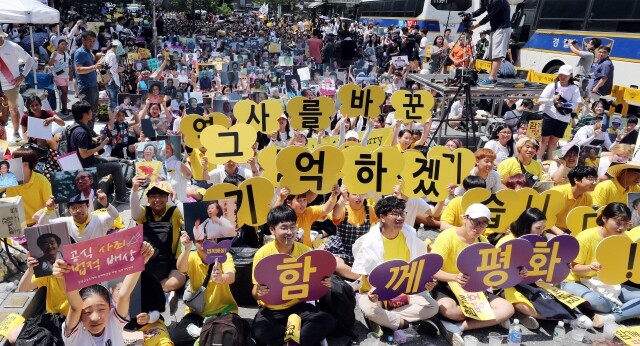hankyoreh
Links to other country sites 다른 나라 사이트 링크
UN recommends Japan adopt victim-centered approach for comfort women issue

The UN Committee on the Elimination of Racial Discrimination (CERD) recommended that the Japanese government adopt measures for a permanent resolution to the military comfort women issue through a fully victim-centered approach.
The recommendation was included in a consideration of state report on Japan published by CERD on Aug. 30. In the text of the report published on the committee’s website, CERD expressed concerns that efforts by the Japanese government “do not take a fully victim-centered approach.”
Commenting on an agreement reached between the South Korea and Japanese governments on Dec. 28, 2015 – which Tokyo views as a “final resolution” on the issue – the committee remarked that “the surviving ‘comfort women’ were not adequately consulted and [. . .] this solution did not provide unequivocal [government] responsibility for the human rights violations committed against these women by the military before and during WWII.”
It also expressed concerns about statements by Japanese government officials minimizing the Japanese government’s responsibility for the comfort women issue.
As a solution, the committee suggested a “victim-centered approach.” In its recommendation, it advised the Japanese government to “ensure a lasting solution” to the issue with a fully victim-centered approach “inclusive of ‘comfort women’ of all nationalities, accepting responsibility for its role in the violation of the human rights of these women.”
CERD previously conducted a review on Japan in Geneva on Aug. 16–17. During the review, the noted US human rights activist Gay MacDougall demanded that the Japanese government apologize to and compensate individual victims.
“I don't think that agreements between governments [. . .] are able or adequate to extinguish the claims of individuals with regards to human rights abuses,” she commented at the time.
MacDougall is the figure behind the 1998 “McDougall Report” by the UN Sub-Commission on the Promotion and Protection of Human Rights, which called for the Japanese government to assume legal responsibility for the comfort women issue and provide compensation.
In response, Masato Otaka, the Japanese ambassador in charge of UN affairs, said the Japanese government “has given the maximum support and compensation.”
“The comfort women issue was fully and irreversibly resolved with the Dec. 2015 agreement,” he said.
CERD conducts reviews of human rights conditions in member countries every four years and publishes reports on its findings. Its recommendations are merely suggestions without binding force.
By Gil Yun-hyung, staff reporter
Please direct comments or questions to [english@hani.co.kr]

Editorial・opinion
![[Editorial] Does Yoon think the Korean public is wrong? [Editorial] Does Yoon think the Korean public is wrong?](https://flexible.img.hani.co.kr/flexible/normal/500/300/imgdb/original/2024/0417/8517133419684774.jpg) [Editorial] Does Yoon think the Korean public is wrong?
[Editorial] Does Yoon think the Korean public is wrong?![[Editorial] As it bolsters its alliance with US, Japan must be accountable for past [Editorial] As it bolsters its alliance with US, Japan must be accountable for past](https://flexible.img.hani.co.kr/flexible/normal/500/300/imgdb/original/2024/0417/6817133413968321.jpg) [Editorial] As it bolsters its alliance with US, Japan must be accountable for past
[Editorial] As it bolsters its alliance with US, Japan must be accountable for past- [Guest essay] Amending the Constitution is Yoon’s key to leaving office in public’s good graces
- [Editorial] 10 years on, lessons of Sewol tragedy must never be forgotten
- [Column] A death blow to Korea’s prosecutor politics
- [Correspondent’s column] The US and the end of Japanese pacifism
- [Guest essay] How Korea turned its trainee doctors into monsters
- [Guest essay] As someone who helped forge Seoul-Moscow ties, their status today troubles me
- [Editorial] Koreans sent a loud and clear message to Yoon
- [Column] In Korea’s midterm elections, it’s time for accountability
Most viewed articles
- 1Samsung barricades office as unionized workers strike for better conditions
- 2[Column] The clock is ticking for Korea’s first lady
- 3[Editorial] When the choice is kids or career, Korea will never overcome birth rate woes
- 4Why Israel isn’t hitting Iran with immediate retaliation
- 5[News analysis] After elections, prosecutorial reform will likely make legislative agenda
- 6S. Korea, Japan reaffirm commitment to strengthening trilateral ties with US
- 7Japan officially says compensation of Korean forced laborers isn’t its responsibility
- 8[Editorial] As it bolsters its alliance with US, Japan must be accountable for past
- 9[Editorial] Does Yoon think the Korean public is wrong?
- 10[Guest essay] How Korea turned its trainee doctors into monsters